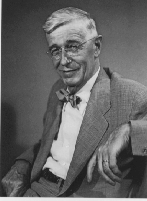Next: Introduction
As We May Think
by Vannevar Bush

This article was originally published in the July 1945 issue of
The Atlantic Monthly. It is reproduced here with their
permission.
HTML version by Denys Duchier, April 1994 - please email comments
and corrections to dduchier@csi.uottawa.ca -
an ASCII version is also available -
both have been donated to Project Gutenberg.
As Director of the Office of Scientific Research and Development, Dr.
Vannevar Bush has coördinated the activities of some six thousand
leading American scientists in the application of science to warfare.
In this significant article he holds up an incentive for scientists
when the fighting has ceased. He urges that men of science should
then turn to the massive task of making more accessible our
bewildering store of knowledge. For many years inventions have
extended man's physical powers rather than the powers of his mind.
Trip hammers that multiply the fists, microscopes that sharpen the
eye, and engines of destruction and detection are new results, but the
end results, of modern science. Now, says Dr. Bush, instruments are
at hand which, if properly developed, will give man access to and
command over the inherited knowledge of the ages. The perfection of
these pacific instruments should be the first objective of our
scientists as they emerge from their war work. Like Emerson's famous
address of 1837 on ``The American Scholar,'' this paper by Dr. Bush
calls for a new relationship between thinking man and the sum of our
knowledge. - The Editor
Note:
In the original article, sections are numbered with no headings.
I have added the above menu, as well as navigational links at the top
and bottom of each section. Also I have inserted a few hyperlinks in
the text itself. - Denys Duchier
Next: Introduction
dduchier@csi.uottawa.ca

